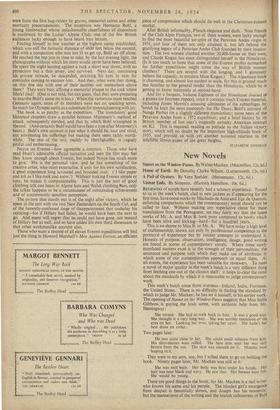New Novels
REVIEWERS of novels have 'recently had a salutary experience. Tossed to us in the week's batch, clad in new jackets as if appearing for the first time, have come, works by Machado de Assis and Eca de Queiroz, enforcing comparisons which the contemporary novel should not be called to face. Without making any superlative claim for these translationS from the Portuguese, we may fairly say that the latest works of Mr. A. and Miss B. look puny compared to books which have been alive and kicking—hard—for a hundred years. This is no shame to Miss B. or Mr. A. We have today a high level of craftsmanship, shown not only by professional competence in the portrayal of experience but by sincere attempts to understand it. Honesty of purpose, observation, intelligence, design, good writing are found in scores of contemporary novels. Where these newly translated masters excel is in the strength of their personalities, the assurance and purpose with which they make use of attributes in which some of our contemporaries approach or equal them. At all events, the experience has been valuable for reviewers. To meet a novel of major quality in the week's batch is a very different thing from fetching one out of the classics shelf: it helps to clear the mind about the standards by which it is reasonable to judge contemporary work.
This week's batch come from overseas—Ireland, India, Formosa, the United States. There is no difficulty in finding the standard by which to judge Mr. Macken; he has set it himself, in his earlier work. The opening of Sunset on the Window-Panes suggests that Miss Stella Gibbons. is guying the Irish scene, with sardonic help from Mr. Hemingway: She turned. She had to walk back to him. It was a good way. She thought it a very long way. She was terribly conscious of the eyes on her. Looking her over, taking her apart. She hadn't her
' best dress on either.
Two pages later:
He was quite close to her. She could smell tobacco from hint. His shirt-sleeves were rolled. The bare arm near her was very brown from the sun. The skin was smooth on it. Muscles were leaping in it.
They were in my arm, too, but I willed them to go on holding the book. Ninety pages later, Mr. Macken was still at it: She was well built. Her body was firm under his hands. Her hair was neat black and wavy. He saw that. Her breasts were full. She would be young.
There are good things in the book, for Mr. Macken is a real writer who knows his scene and his people., The blinded girl's emergence from despair is beautifully shown, and Joseph has his moments: but the mannerisms of the writing and the loutish callousness of Bart
may prevent many readers from getting far enough into the book to sigh with relief when Mr. Macken recovers his old form.
In the sense in which the word is generally used in these columns, Mrs. Wilson cannot write at all. There is hardly a cliche she does not exultantly produce, and the more impassioned her theme the lusher her language. 'Dawn—that brief, breath-taking moment when the first golden rays stabbed the cool silver haze which had settled over thatched roofs, splintering the green fronds of a neem tree or a gold mohur into a thousand quivering jewelled facets!' And—believe it or not—`assuaging his deep thirst from the sweet, fresh coolness that was her lips.' Yet despite its naïve absurdities, there is the stuff of life in this tale of Brahmin and untouchable in modern India, and it leaves one respecting its author. Reading it is like receiving the ministrations of a hospital nurse whom one admires for her skill and kindness but whose conversation exasperates one to the edge of endurance.
Mr. Sneider's scene is also in the East—Formosa—and he deals with the conflicts into which varying loyalties and interests have driven the tormented island. An American journalist, an 'assimilated savage' and his people, trying to protect the oyster beds from the Nationalist 'Save the Country' soldiers; the theft of a family god, the struggles to regain it, a girl sold into a brothel, executions, hatreds, politics gone mad, and, behind it all, the smiling beauty of the scene; Mr. Sneider handles his subject with assurance and compassion. A Pail of Oysters manages to combine excitement with calm, and to be full of incident without becoming crowded or confused. In fact, it sets a standard for House of Earth.
There remains M. Simenon, whose talent and background have been so exultantly French that one could not imagine him elsewhere. Yet for these two long-short stories he has gone to the USA. It has been one of his many virtues that crime in his pages has the sordid accessories that so often•in fact belong to it; as anyone will know who has seen a house where burglars have had time to leave their trademarks. That atmosphere of unmade beds, unemptied pails, unopened windows, and unwashed bodies—could M. Simenon escape it, or transfer it? These stories are the answer. I will say only that he seems as much at home in America as in France. The murder of a girl makes a schoolmaster come to terms with the shadow side of his own nature: gangster war compels a young man to hunt his brother. M. Simenon shows us that, salutary though it is to be confronted by masters of an age gone by, we can measure the novels of our own time by our own time's yardsticks.
L. A. G. STRONG











































 Previous page
Previous page